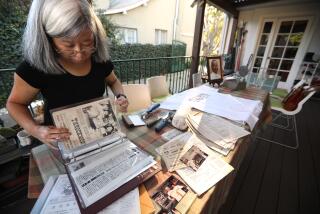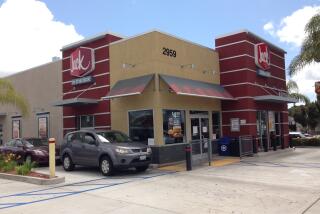‘Hobby’ Ends in Restaurant Merger Deal : Hungry Tiger Chain Started With Single Sherman Oaks Eatery
Around 1962, Bob Prescott and Wayne Hoffman used to eat at an Italian restaurant on Ventura Boulevard in Sherman Oaks. The place wasn’t doing too well, though, and, according to Hoffman, the owner kept borrowing money from Prescott--so much that Prescott ended up owning the place.
Thus Hungry Tiger was born. Prescott and Hoffman were president and chairman, respectively, of Flying Tiger air-freight line, which Prescott founded.
They knew nothing about the restaurant business and ran through several managers before getting the business on track. Later they acquired a second restaurant, in Westchester, then a third, in Palos Verdes. Soon there were others around the Southland, operating under several names.
Worth $23 Million
Today the 40-unit seafood restaurant chain is worth about $23 million, the approximate value of stock W. R. Grace & Co. has agreed to trade for Hungry Tiger in a merger agreement announced Friday. Hungry Tiger is publicly held, and the airline’s parent company, Tiger International, doesn’t own any shares.
Prescott died in 1978. Hoffman remains chairman of Tiger International and a Hoffman family trust still owns 398,112 shares.
Under the acquisition agreement, Grace is to trade .16092 shares of its own stock for each share of Hungry Tiger stock. But it has the option of buying 700,000 of the shares, including Hoffman’s 13.8% stake, for $7 a share in cash.
Thus, what Hoffman said started as a “hobby” is worth about $2.8 million to him.
“We’ve taken this about as far as we can take it,” Hoffman said. He said he believes Hungry Tiger has opportunities to expand but lacks the resources to exploit them.
Grace, a $6.2-billion conglomerate based in New York, has those resources. With 770 restaurants in chains around the country, Grace reported sales of $484.6 million for the first half of this year, up 28% from the same period last year. Profits were $10.1 million, up 71%.
3 Losing Quarters
Hungry Tiger has not fared so well, having posted three consecutive losing quarters through June 7. For that 40-week period it lost $856,000 on sales of $49.6 million, contrasted with earnings of $667,000 on sales of $52.3 million for the same period a year ago.
Hoffman confirmed that Hungry Tiger president Vincent Kikugawa, a former Grace restaurant executive, was instrumental in the acquisition.
More to Read
Inside the business of entertainment
The Wide Shot brings you news, analysis and insights on everything from streaming wars to production — and what it all means for the future.
You may occasionally receive promotional content from the Los Angeles Times.










